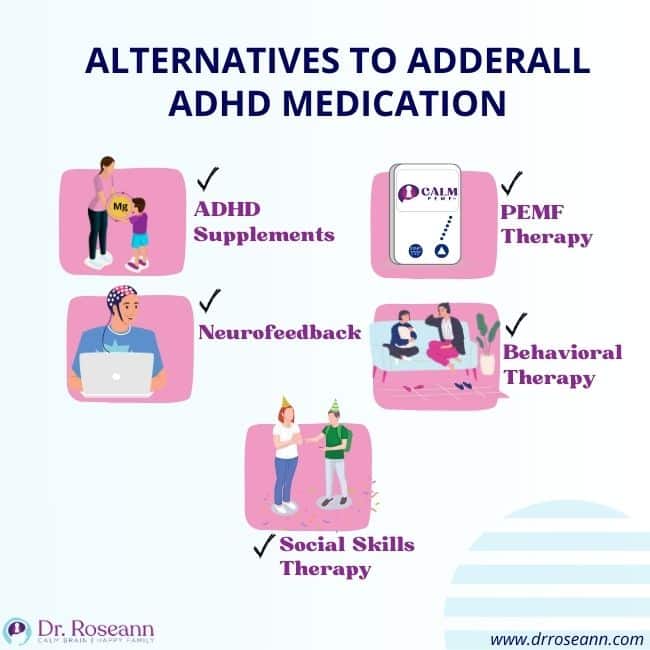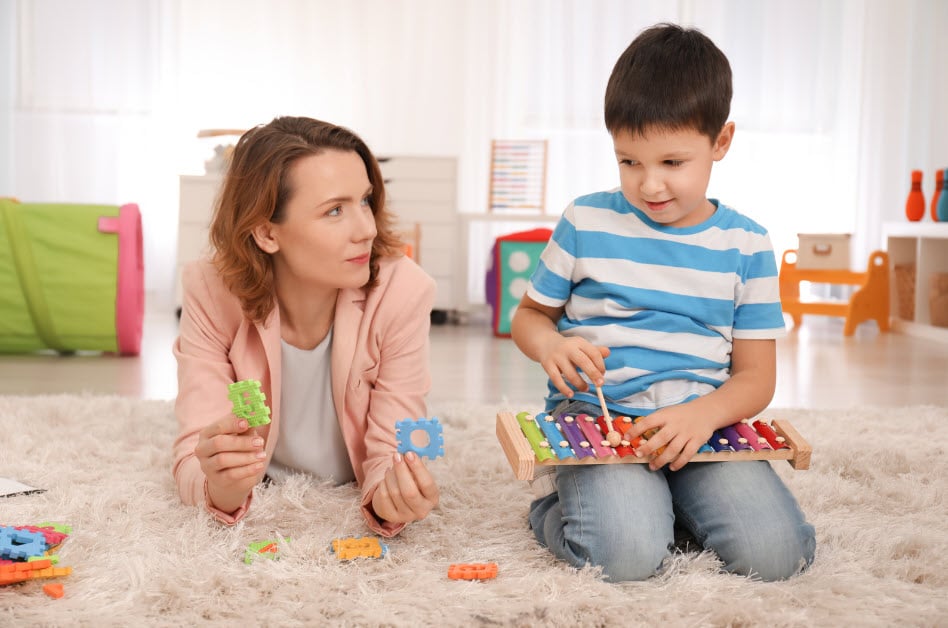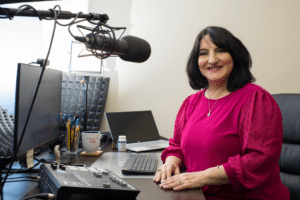The use of medication In today's world, especially for conditions like ADHD, has become quite common. But with the use of these drugs come the side effects that can sometimes make children feel not quite like themselves. Many of the children, teens and adults I work with, tell me things such as, “I feel flat on my ADHD medication,” “I have no appetite” or “I feel so anxious.”
That is why so many people seek my out courses and my one-to-one program because they want science-backed ways to increase focus without side effects. Learning about the impact and side effects is crucial for our children's health and well-being.
Understanding ADHD Medication Side Effects
The use of Adderall and similar medications often sparks concerns among parents and families due to their potential side effects. While these drugs can provide benefits in managing ADHD symptoms, parents must weigh the possible drawbacks, including stomach discomfort and other more severe reactions.
The side effects of Adderall prompt questions about its safety, especially because adverse reactions, such as cardiovascular and psychiatric effects, are a possibility.
Beyond physical side effects, it's also essential to recognize the impact of Adderall's impact on a child or teen’s mental well-being. When not adequately monitored, constant use can evoke distress and confusion, leading to feelings of frustration, anxiety, or self-doubt.
Children and teens may question why they feel unwell or different from their peers, affecting their self-esteem and sense of identity. Similarly, parents may struggle with guilt or uncertainty as they witness their child's discomfort. Finding the delicate balance between managing symptoms and minimizing adverse effects can be difficult with ADHD medications.
Alternatives to the Side Effects of Adderall ADHD Medication

When considering ADHD medication, it's essential to think through all options and weigh the risks and benefits carefully. While medication can be effective for some, others may seek alternatives that offer similar benefits with fewer risks. Let's list some natural and safe options for Adderall:
1. ADHD Supplements
Supplements containing nutrients like omega-3 fatty acids, zinc, and magnesium have shown promise in managing ADHD symptoms. Many individuals, especially children, find relief from these natural remedies.
One study examined how L-threonic acid Magnesium Salt (LTAMS) might help adults with ADHD. Fifteen adults with moderate ADHD took LTAMS for up to 12 weeks. Almost half of them showed improvement in ADHD symptoms, as measured by different tests. The participants also showed better performance on IQ tests (Surman et al., 2020)
2. Neurofeedback
Neurofeedback therapy trains individuals to regulate their brainwaves, potentially reducing ADHD symptoms. It's a non-invasive approach that focuses on improving brain function without medication.
One study analyzed brain activity during neurofeedback (NF) training and its correlation with clinical outcomes in children with ADHD. A separate study compared the effects of different NF techniques on ADHD symptoms in children with tic disorder. Both studies suggest that NF training can effectively treat ADHD symptoms (Gevensleben et al., 2014).
3. PEMF Therapy
Pulsed electromagnetic field (PEMF) therapy is another non-invasive option that targets brain activity. This therapy exposes the brain to electromagnetic pulses to improve focus and attention in children and teens with ADHD.
4. Behavioral Therapy
Therapeutic interventions, such as cognitive-behavioral therapy (CBT) and behavior modification techniques, can help individuals develop coping strategies and improve self-control without relying solely on medication.
5. Social Skills Therapy
Many children with ADHD struggle with social interactions. Social skills therapy focuses on improving communication, empathy, and relationship-building skills, which can positively impact overall well-being.
Considering the Pros and Cons of ADHD Medications
When it comes to managing ADHD, it's essential to consider both the benefits and risks of medication. While medication may offer immediate relief for some, others may find that the benefits of avoiding drugs outweigh the risks. It's essential to think healthily and discuss options with healthcare professionals to find the best approach for individual needs.
In ADHD management, medication represents just one aspect of a multifaceted approach. Beyond pharmaceutical interventions, various therapeutic modalities, lifestyle modifications, and alternative treatments merit consideration.
Each option, from behavioral therapy to dietary adjustments, has potential benefits and limitations. Parents can tailor their treatment plan to align with their unique preferences and values by adopting a holistic perspective and exploring diverse strategies.
Reducing Reliance on ADHD Medications
For those seeking alternatives to medication in managing ADHD, a variety of strategies exist to mitigate reliance on pharmaceuticals and reduce the risk of potential side effects. Collaborating closely with healthcare professionals is essential, as they can guide in navigating treatment options.
Lifestyle modifications, including maintaining a nutritious diet, regular exercise, and stress management techniques, offer a holistic approach to supporting overall well-being and addressing ADHD symptoms.
Therapeutic interventions such as behavioral therapy and social skills training provide practical strategies for improving attention, organization, and interpersonal communication. Natural supplements like omega-3 fatty acids, zinc, and magnesium also offer benefits.
However, it is crucial to consult a healthcare professional before incorporating them into a treatment regimen. By taking a proactive and informed approach to treatment, parents can empower themselves to make decisions that prioritize their child's well-being and minimize potential risks.
If your child's hyperactivity, impulsivity, or difficulties with focus and attention are wreaking havoc on their grades and causing turmoil in your household, download The Natural ADHD Focus Formula Kit. Boost your child’s attention, focus, and school performance without medication!
What is the medication for ADHD?
The primary medications used to treat ADHD are stimulants like Adderall, Ritalin, and Concerta, which work by increasing dopamine and norepinephrine levels in the brain to improve focus and attention. Non-stimulant medications such as Strattera and Intuniv may also be prescribed for individuals who cannot tolerate stimulants or prefer alternative options.
Is it ok to take Adderall with comfort drugs?
Combining Adderall with comfort drugs, especially without medical supervision, can be dangerous and increase the risk of adverse effects such as respiratory depression, cardiovascular complications, and overdose. It's essential to consult with a healthcare professional before mixing Adderall with any other medications or substances to ensure safety and minimize risks.
What happens if you use Adderall without guidance from a healthcare provider?
Using Adderall without guidance from a healthcare provider can lead to various risks and complications. These include potential misuse, dependency, and addiction. Without proper medical supervision, individuals may also experience adverse side effects such as increased heart rate, high blood pressure, insomnia, anxiety, and mood changes.
What are the pros and cons of medication for mental illness?
The pros of medication for mental illness include symptom relief, improved functioning, and enhanced quality of life for many individuals. However, some cons include potential side effects, dependency, and the need for ongoing monitoring and adjustments. Additionally, medication may not be effective for everyone, and finding the proper drug and dosage can take time, leading to frustration and trial-and-error processes.
How quickly do side effects from medication happen?
The onset of side effects from medication can vary widely depending on factors such as the type of medication, individual susceptibility, dosage, and route of administration. Some side effects may occur shortly after taking the drug, while others may develop gradually over time with prolonged use.
Why do I always get side effects from medication?
Experiencing side effects from medication can occur for several reasons. You may be more sensitive to certain medications or have underlying health conditions that increase your risk of adverse reactions.
What is considered long term use of medication?
Long-term use of medication typically refers to the continued use of a medication over an extended period, often beyond several weeks or months. The specific duration can vary depending on the medication and treated condition.
Why medicine have side effects?
Medications can have side effects because they interact with the body's complex biological systems in various ways. While medications are designed to target specific pathways or functions to treat a particular condition, they can also affect other parts of the body or produce unintended responses.
Why do you use stimulants for ADHD?
Stimulants are commonly used to treat ADHD because they can help improve focus, attention, and impulse control in individuals with the condition. These medications increase neurotransmitters like dopamine and norepinephrine levels in the brain, which play critical roles in regulating attention and behavior.
Citations
Gevensleben, H., Kleemeyer, M., Rothenberger, L. G., Studer, P., Flaig-Röhr, A., Moll, G. H., Rothenberger, A., & Heinrich, H. (2014). Neurofeedback in ADHD: Further Pieces of the Puzzle. Brain Topography, 27(1), 20–32. https://doi.org/10.1007/s10548-013-0285-y
Surman, C., Vaudreuil, C., Boland, H., Rhodewalt, L., DiSalvo, M., & Biederman, J. (2020). L-Threonic Acid Magnesium Salt Supplementation in ADHD: An Open-Label Pilot Study. Journal of Dietary Supplements, 18(2), 119–131. https://doi.org/10.1080/19390211.2020.1731044
Dr. Roseann is a mental health expert in ADHD Treatment who is frequently in the media:
- The Healthy 12 Silent Signs of Adult ADHD You Might Be Ignoring
- Seeme & Liz 12 Essential Parenting Tips For Kids with ADHD
- Evan H. Hirsch, MD – EnergyMD with Dr. Roseann Capanna-Hodge (Video) Topic: Is it Brain Fog or ADHD?
Always remember… “Calm Brain, Happy Family™”
Disclaimer: This article is not intended to give health advice and it is recommended to consult with a physician before beginning any new wellness regime. *The effectiveness of diagnosis and treatment vary by patient and condition. Dr. Roseann Capanna-Hodge, LLC does not guarantee certain results.
Are you looking for SOLUTIONS for your struggling child or teen?
Dr. Roseann and her team are all about science-backed solutions, so you are in the right place!
Is it ADHD or something else?
Take the ADHD Quiz to discover why your kid can’t focus, listen, or complete tasks
Dr. Roseann is a Children’s Mental Health Expert and Licensed Therapist who has been featured in/on hundreds of media outlets including The Mel Robbins Show, CBS, NBC, PIX11 NYC, Today, FORBES, CNN, The New York Times, The Washington Post, Business Insider, Women’s Day, Healthline, CNET, Parade Magazine and PARENTS. FORBES called her, “A thought leader in children’s mental health.”

She coined the terms, “Re-entry panic syndrome” and “eco-anxiety” and is a frequent contributor to media on mental health.
Dr. Roseann Capanna-Hodge has three decades of experience in working with children, teens and their families with attention-deficit hyperactivity disorder (ADHD), autism, concussion, dyslexia and learning disability, anxiety, Obsessive Compulsive Disorder (OCD), depression and mood disorder, Lyme Disease, and PANS/PANDAS using science-backed natural mental health solutions such as supplements, magnesium, nutrition, QEEG Brain maps, neurofeedback, PEMF, psychotherapy and other non-medication approaches.
She is the author of three bestselling books, It’s Gonna Be OK!: Proven Ways to Improve Your Child's Mental Health, The Teletherapy Toolkit, and Brain Under Attack. Dr. Roseann is known for offering a message of hope through science-endorsed methods that promote a calm brain.
Her trademarked BrainBehaviorResetⓇ Program and It’s Gonna be OK!Ⓡ Podcast has been a cornerstone for thousands of parents facing mental health, behavioral or neurodevelopmental challenges.
She is the founder and director of The Global Institute of Children’s Mental Health, Neurotastic™Brain Formulas and Dr. Roseann Capanna-Hodge, LLC. Dr. Roseann is a Board Certified Neurofeedback (BCN) Practitioner, a Board Member of the Northeast Region Biofeedback Society (NRBS), Certified Integrative Mental Health Professional (CIMHP) and an Amen Clinic Certified Brain Health Coach. She is also a member of The International Lyme Disease and Associated Disease Society (ILADS), The American Psychological Association (APA), Anxiety and Depression Association of America (ADAA) National Association of School Psychologists (NASP), International OCD Foundation (IOCDF).
© Roseann-Capanna-Hodge, LLC 2024












